中考英语复习讲解(打印版)
(完整版)人教版中考英语教材知识梳理讲义第15讲9年级全册Unit3--4
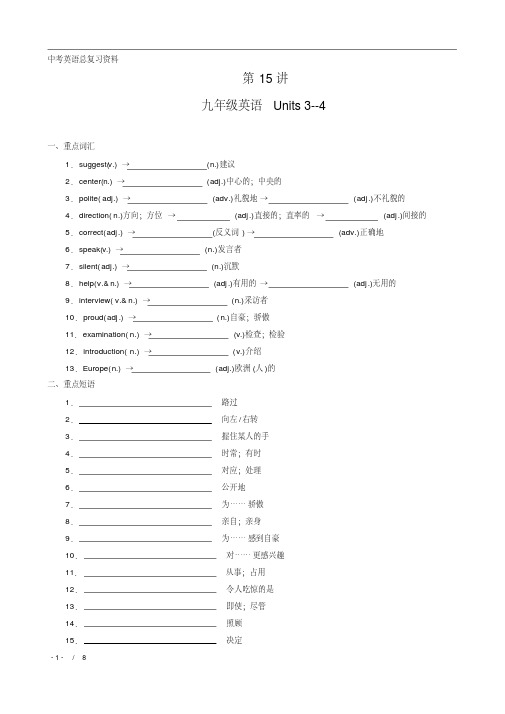
中考英语总复习资料第15讲九年级英语Units 3--4一、重点词汇1.suggest(v.)→(n.)建议2.center(n.)→(adj.)中心的;中央的3.polite(adj.)→(adv.)礼貌地→(adj.)不礼貌的4.direction(n.)方向;方位→(adj.)直接的;直率的→(adj.)间接的5.correct(adj.)→(反义词)→(adv.)正确地6.speak(v.)→(n.)发言者7.silent(adj.)→(n.)沉默8.help(v.&n.)→(adj.)有用的→(adj.)无用的9.interview(v.&n.)→(n.)采访者10.proud(adj.)→(n.)自豪;骄傲11.examination(n.)→(v.)检查;检验12.introduction(n.)→(v.)介绍13.Europe(n.)→(adj.)欧洲(人)的二、重点短语1.路过2.向左/右转3.握住某人的手4.时常;有时5.对应;处理6.公开地7.为……骄傲8.亲自;亲身9.为……感到自豪10.对……更感兴趣11.从事;占用12.令人吃惊的是13.即使;尽管14.照顾15.决定三、重点句型1.你能告诉我洗手间在哪吗?you please tell me the restrooms ?2.直到你尝试你才知道一些事。
You know you try something.3.起初我很害怕,但喊叫还真的很管用。
I was scared ,but shouting really did .4.有时我们甚至需要花些时间来导入一个请求。
Sometimes we even need to spend time to a request.5.我过去害怕黑暗。
I afraid of the dark.6.自从我们最后一次见到我们的小学同学已经有三年了。
It three years we last saw our primary school classmates.7.她过去没看很多电影。
最新初中中考英语总复习语法大全[可打印]
![最新初中中考英语总复习语法大全[可打印]](https://img.taocdn.com/s3/m/7799717f43323968011c92bb.png)
2、普通名词是许多人或事物的共有名称。如:pupil, family, man, foot.
(1)派生名词:①动词+er/or②动词+ing③动词+(t)ion④形容词+ness⑤其他,如:inventor, learner, swimming, congratulation, kindness, carelessness, knowledge
(2)派生形容词:①名词+y②名词+ful③动词+ing/ed④friendly⑤dangerous⑥Chinese;Japanese⑦English⑧French⑨German⑩国名+(i)an如:snowy, sunny,hopeful, beautiful, interesting, follwing, daily(每日的),nervous, delicious
9、连词(conj.): 用来连接词、短语或句子。如and, but, before .
10、感叹词(interj..)表示喜、怒、哀、乐等感情。如:oh, well, hi, hello.
2、句子成分:英语句子成分分为七种:主语、谓语、宾语、定语、状语、表语、宾语补足语。
1、主语是句子所要说的人或事物,回答是“谁”或者“什么”。通常用名词或代词担任。如:I’m Miss Green.(我是格林小姐)
4、宾语表示及物动词的对象或结果,回答做的是“什么”。通常由名词或代词担任。如:He can spellthe word.(他能拼这个词)
有些及物动词带有两个宾语,一个指物,一个指人。指物的叫直接宾语,指人的叫间接宾语。间接宾语一般放在直接宾语的前面。如:He wrotemea letter.(他给我写了一封信)
2024年江苏盐城中考英语试卷真题及答案详解(精校打印版)
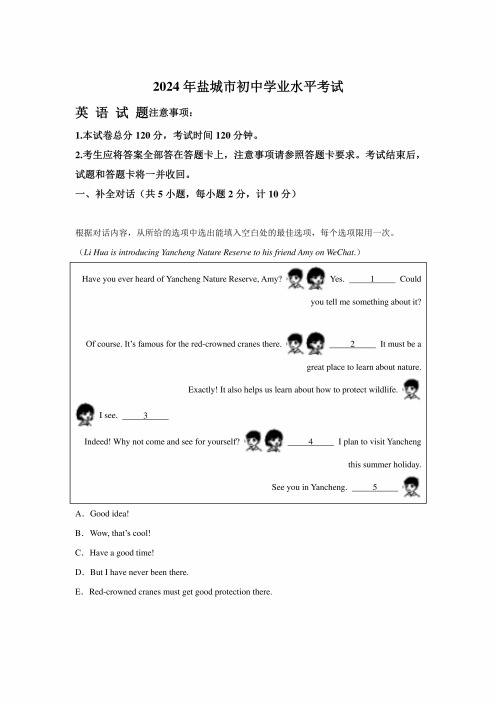
2024年盐城市初中学业水平考试英语试题注意事项:1 .本试卷总分120分,考试时间120分钟。
2.考生应将答案全部答在答题卡上,注意事项请参照答题卡要求。
考试结束后, 试题和答题卡将一并收回。
一、补全对话(共5小题,每小题2分,计10分)根据对话内容,从所给的选项中选出能填入空白处的最佳选项,每个选项限用一次。
(£z Hua is introducing Yancheng Nature Reserve to his friend Amy on WeChat.)Have you ever heard of Yancheng Nature Reserve, Amy?,I Yes.Could1you tell me something about it?Of course. Ifs famous fbr the red-crowned cranes there. 5©2It must be agreat place to learn about nature.Exactly! It also helps us learn about how to protect wildlife.Indeed! Why not come and see for yourself?I plan to visit YanchengSee you in Yancheng.this summer holiday.5A.Good idea!345B. Wow, thafs cool!C . Have a good time !D. But I have never been there.E. Red-crowned cranes must get good protectionthere.二、完形填空(共15小题,每小题1分,计15分)阅读下面短文,掌握其大意,然后从各题所给的四个选项中选出一个最佳答案。
人教版初中英语中考复习知识点归纳总结全册(K12教育文档)
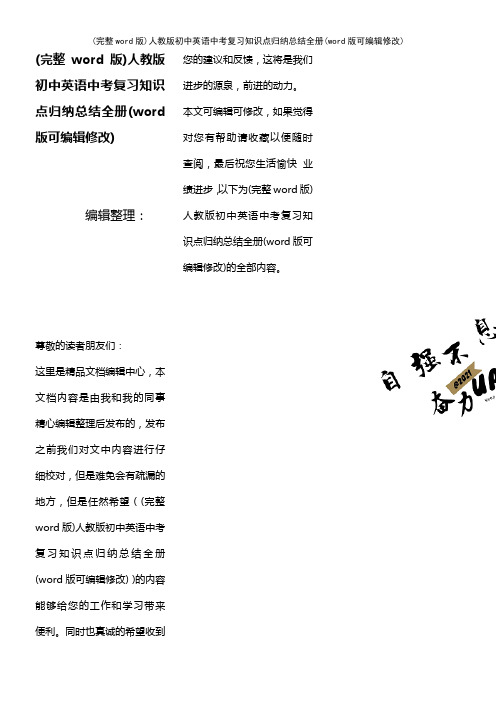
(完整word版)人教版初中英语中考复习知识点归纳总结全册(word版可编辑修改)(完整word版)人教版初中英语中考复习知识点归纳总结全册(word 版可编辑修改)编辑整理:尊敬的读者朋友们:这里是精品文档编辑中心,本文档内容是由我和我的同事精心编辑整理后发布的,发布之前我们对文中内容进行仔细校对,但是难免会有疏漏的地方,但是任然希望((完整word版)人教版初中英语中考复习知识点归纳总结全册(word版可编辑修改))的内容能够给您的工作和学习带来便利。
同时也真诚的希望收到您的建议和反馈,这将是我们进步的源泉,前进的动力。
本文可编辑可修改,如果觉得对您有帮助请收藏以便随时查阅,最后祝您生活愉快业绩进步,以下为(完整word版)人教版初中英语中考复习知识点归纳总结全册(word版可编辑修改)的全部内容。
人教版英语中考分册复习知识点Unit 1—Unit 2重点句型1. —My name’s Jenny. -I’m Gina。
Nice to meet you。
2。
—What’s your/his/her name?-My/His/Her name is …。
3。
What's your/his/her family/first name?4。
-What's your telephone number?-It's 218-9176.5。
What's his/ her telephone number? 6。
—What’s this/that in English?—It’s a ruler。
7。
-Is this/that your pencil?—Yes, it is。
/No, it isn’t.8. How do you spell pencil?/Spell pencil。
/Can you spell pencil?9. Is that your computer game in the lostand found case?10。
中考英语语法讲解资料及练习(共18讲)
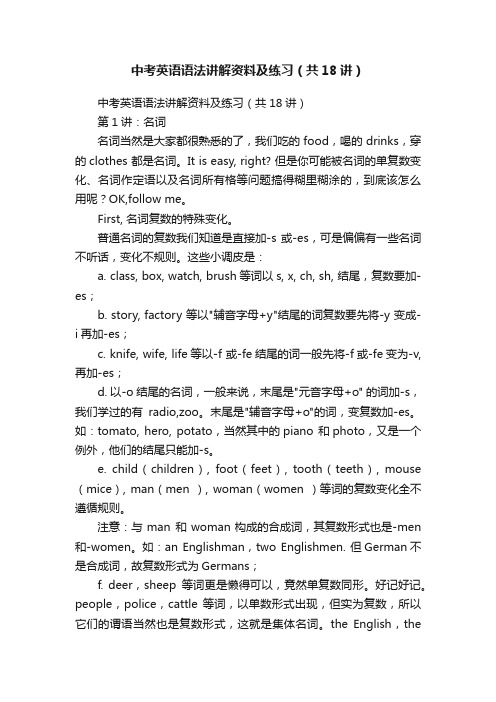
中考英语语法讲解资料及练习(共18讲)中考英语语法讲解资料及练习(共18讲)第1讲:名词名词当然是大家都很熟悉的了,我们吃的food,喝的drinks,穿的clothes 都是名词。
It is easy, right? 但是你可能被名词的单复数变化、名词作定语以及名词所有格等问题搞得糊里糊涂的,到底该怎么用呢?OK,follow me。
First, 名词复数的特殊变化。
普通名词的复数我们知道是直接加-s或-es,可是偏偏有一些名词不听话,变化不规则。
这些小调皮是:a. class, box, watch, brush等词以s, x, ch, sh, 结尾,复数要加-es;b. story, factory 等以"辅音字母+y"结尾的词复数要先将-y 变成-i再加-es;c. knife, wife, life等以-f 或-fe结尾的词一般先将-f或-fe变为-v, 再加-es;d. 以-o结尾的名词,一般来说,末尾是"元音字母+o" 的词加-s,我们学过的有radio,zoo。
末尾是"辅音字母+o"的词,变复数加-es。
如:tomato, hero, potato,当然其中的piano 和photo,又是一个例外,他们的结尾只能加-s。
e. child(children), foot(feet), tooth(teeth), mouse (mice), man(men ), woman(women )等词的复数变化全不遵循规则。
注意:与man 和woman构成的合成词,其复数形式也是-men 和-women。
如:an Englishman,two Englishmen. 但German不是合成词,故复数形式为Germans;f. deer,sheep等词更是懒得可以,竟然单复数同形。
好记好记。
people,police,cattle 等词,以单数形式出现,但实为复数,所以它们的谓语当然也是复数形式,这就是集体名词。
初中英语全部知识点总结(打印版)

初中英语全部知识点总结(打印版)Middle School English All Knowledge Points Summary (Print Edition)1. Grammar1.1 Parts of speech:Noun: a word that refers to a person, place, thing, or idea (e.g. teacher, garden, book)Verb: a word that describes an action, state, or occurrence (e.g. run, sleep, study)Adjective: a word that describes or gives more information about a noun (e.g. happy, big, smart)Adverb: a word that describes or adds more information to a verb, an adjective, or another adverb (e.g. quickly, very, carefully)Pronoun: a word that is used instead of a noun (e.g. he, she, they)Preposition: a word that links a noun, pronoun, or phrase to other words in a sentence (e.g. in, on, at)Conjunction: a word that connects words, phrases, or clauses (e.g. and, but, because)Interjection: a word or phrase that expresses emotion or surprise (e.g. wow, hey, ouch)1.2 Sentence structure:Simple sentence: a sentence with one subject and one predicate (e.g. The cat sleeps.)Compound sentence: a sentence with two or more independent clauses joined by a conjunction (e.g. The cat sleeps, but the dog barks.)Complex sentence: a sentence with an independent clause and one or more dependent clauses (e.g. When the cat sleeps, the dog barks.)1.3 Tenses:Present simple: used to describe habits, routines, and general truths (e.g. He plays football every Sunday.)Past simple: used to describe completed actions in the past (e.g. She watched a movie yesterday.)Present continuous: used to describe actions happening now or in the near future (e.g. They are eating lunch right now.)Future simple: used to describe actions that will happen in the future (e.g. I will go to the park tomorrow.)2. Vocabulary2.1 Synonyms: words that have similar meanings (e.g. happy and joyful)2.2 Antonyms: words that have opposite meanings (e.g. happy and sad)2.3 Homophones: words that sound the same but have different meanings and spellings (e.g. there, their, they're)2.4 Idioms: phrases that have a meaning different from their literal interpretation (e.g. It's raining cats and dogs.)3. Reading comprehension3.1 Main idea: the most important point of a passage or text3.2 Supporting details: information that explains or supports the main idea3.3 Inference: a logical guess based on evidence from the text3.4 Summarizing: briefly stating the main points of a passage in your own words4. Writing skills4.1 Narrative writing: telling a story with a beginning, middle, and end4.2 Descriptive writing: creating vivid images using sensory details4.3 Persuasive writing: convincing the reader to believe or do something4.4 Expository writing: explaining or informing the reader about a topic5. Speaking and listening5.1 Giving presentations: organizing information and speaking confidently in front of others5.2 Participating in discussions: expressing opinions, asking questions, and responding to others respectfully5.3 Active listening: paying attention to the speaker, asking clarifying questions, and summarizing key pointsIn conclusion, mastering these key English language concepts will help students communicate effectively, understand written texts, and express ideas creatively. With practice and dedication, students can excel in all areas of English language learning.。
2020年英语中考必备1600词汇总详解(整理打印版)

中考英语1600词汇总详解Aa (an) art.一个,某个,任何一个不定冠词常见用法:1)首次提到,表泛指2)有数量”一”的概念,但不如one强烈ability n.能力;才干;才能短语:1.a man of ability有能力的人2.the ability to do sth做某事的能力able adj.有才干的;聪颖的短语:be able to do sth有能力做某事about prep.对于,关于;大约;在…周围短语:1. be about to 即将e.g.We were about to go when it suddenly rained.我们正要出发,突然天下雨了。
2.look about四处寻找3.run about乱跑4.What/How about…?怎么样above prep.& adj.在…之上;超过;大于,多于; 上面的短语:1.above all 最重要的 e.g.Above all, the work must be finished before nine by ourselves.最重要的是工作必须在九点之前由我们自己独立完成。
注意:above的反义词为below abroad adv.在外国;广泛地;传播短语:1. from abroad 从国外,从海外e.g. His parents has just come back from abroad.他父母刚从海外回来,我们去看望他们吧。
2. go abroad 出国accept v.接受;赞同;欢迎;听从近义词辨析:accept 和receiveaccept是”接受、认可”的意思,收到并接受;receive有”收到”之意,但不一定接受。
e.g.I received a lot of gifts on my birthday, but I didn‟t accept any.生日那天我收到许多礼物,但我并没有收下任何礼物。
中考英语不定代词用法总结(打印背诵版)
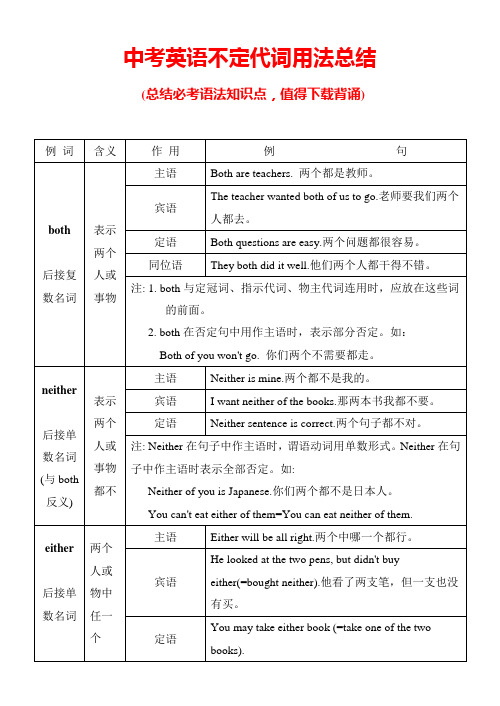
中考英语不定代词用法总结(总结必考语法知识点,值得下载背诵)例词含义作用例句both后接复数名词表示两个人或事物主语Both are teachers. 两个都是教师。
宾语The teacher wanted both of us to go.老师要我们两个人都去。
定语Both questions are easy.两个问题都很容易。
同位语They both did it well.他们两个人都干得不错。
注: 1. both与定冠词、指示代词、物主代词连用时,应放在这些词的前面。
2. both在否定句中用作主语时,表示部分否定。
如:Both of you won't go. 你们两个不需要都走。
neither后接单数名词(与both 反义) 表示两个人或事物都不主语Neither is mine.两个都不是我的。
宾语I want neither of the books.那两本书我都不要。
定语Neither sentence is correct.两个句子都不对。
注: Neither在句子中作主语时,谓语动词用单数形式。
Neither在句子中作主语时表示全部否定。
如:Neither of you is Japanese.你们两个都不是日本人。
You can't eat either of them=You can eat neither of them.either后接单数名词两个人或物中任一个主语Either will be all right.两个中哪一个都行。
宾语He looked at the two pens, but didn't buyeither(=bought neither).他看了两支笔,但一支也没有买。
定语You may take either book (=take one of the twobooks).=You can't take both of the two books. 两本书你可以任选一本。
人教版九年级英语期中复习知识点总结(1-6)直接打印
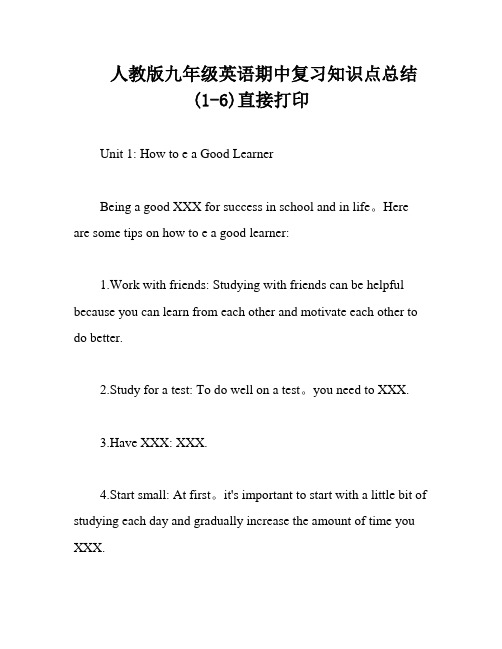
人教版九年级英语期中复习知识点总结(1-6)直接打印Unit 1: How to e a Good LearnerBeing a good XXX for success in school and in life。
Here are some tips on how to e a good learner:1.Work with friends: Studying with friends can be helpful because you can learn from each other and motivate each other to do better.2.Study for a test: To do well on a test。
you need to XXX.3.Have XXX: XXX.4.Start small: At first。
it's important to start with a little bit of studying each day and gradually increase the amount of time you XXX.5.Find the secret to success: The secret to being a good learner is to find what works best for you and stick with it.6.Don't be afraid to make mistakes: Making mistakes is a natural part of the learning process。
Learn from your mistakes and keep moving forward.7.XXX: If you're struggling with a particular subject。
九年级英语知识点总结打印
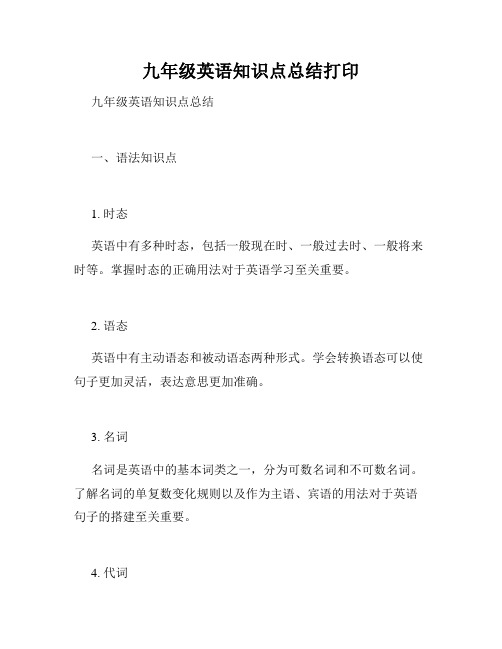
九年级英语知识点总结打印九年级英语知识点总结一、语法知识点1. 时态英语中有多种时态,包括一般现在时、一般过去时、一般将来时等。
掌握时态的正确用法对于英语学习至关重要。
2. 语态英语中有主动语态和被动语态两种形式。
学会转换语态可以使句子更加灵活,表达意思更加准确。
3. 名词名词是英语中的基本词类之一,分为可数名词和不可数名词。
了解名词的单复数变化规则以及作为主语、宾语的用法对于英语句子的搭建至关重要。
4. 代词代词可以替代名词来使用,分为人称代词、物主代词、指示代词等。
学会正确使用各种代词可以使句子更加简洁明了。
5. 形容词和副词形容词用于修饰名词,而副词则用于修饰动词、形容词或者其他副词。
正确运用形容词和副词可以使句子更加生动有趣。
6. 冠词冠词包括不定冠词a/an和定冠词the。
了解冠词的用法可以帮助我们确定名词在句子中的具体意义。
7. 介词介词用于表示位置、方向、时间等概念,在句子中起到连接作用。
熟练掌握介词的用法可以使句子结构更加清晰。
8. 连词连词用于连接句子、词组或者词与词之间的关系。
常见的连词有并列连词、从属连词等。
学会使用连词可以帮助我们组织句子,使之更加连贯。
二、词汇知识点1. 同义词和反义词同义词是指意思相近或相同的词,反义词则是意思相反的词。
掌握同义词和反义词可以帮助我们扩展词汇量,丰富句子的表达。
2. 拼写正确的拼写是英语学习的基础。
多读、多写、多记可以提高我们的拼写水平。
3. 词组和习惯用语词组和习惯用语是英语中常用的固定搭配。
学会使用词组和习惯用语可以使我们的表达更为地道。
4. 成语和俚语成语和俚语是英语中具有文化背景的表达方式。
了解成语和俚语的含义和用法可以更好地理解英语文化。
三、阅读理解技巧1. 主旨大意阅读理解中最重要的任务之一是找出文章的主旨大意。
通过分析文章的标题、首尾句以及段落主题句,帮助我们理解文章的中心思想。
2. 细节理解细节理解是指通过阅读文章找出特定的细节信息。
中考英语复习讲解打印版共16页文档
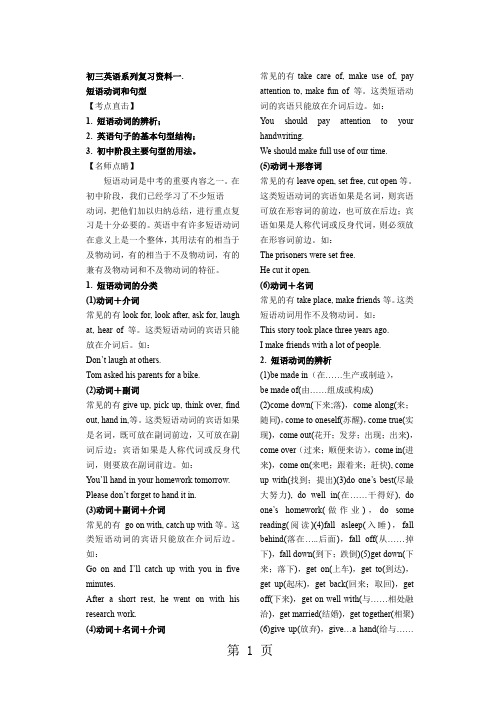
初三英语系列复习资料一.短语动词和句型【考点直击】1. 短语动词的辨析;2. 英语句子的基本句型结构;3. 初中阶段主要句型的用法。
【名师点睛】短语动词是中考的重要内容之一。
在初中阶段,我们已经学习了不少短语动词,把他们加以归纳总结,进行重点复习是十分必要的。
英语中有许多短语动词在意义上是一个整体,其用法有的相当于及物动词,有的相当于不及物动词,有的兼有及物动词和不及物动词的特征。
1. 短语动词的分类(1)动词+介词常见的有look for, look after, ask for, laugh at, hear of 等。
这类短语动词的宾语只能放在介词后。
如:Don’t laugh at others.Tom asked his parents for a bike.(2)动词+副词常见的有give up, pick up, think over, find out, hand in,等。
这类短语动词的宾语如果是名词,既可放在副词前边,又可放在副词后边;宾语如果是人称代词或反身代词,则要放在副词前边。
如:You’ll hand in your homework tomorrow. Please don’t forget to hand it in.(3)动词+副词+介词常见的有go on with, catch up with等。
这类短语动词的宾语只能放在介词后边。
如:Go on and I’ll catch up with you in five minutes.After a short rest, he went on with his research work.(4)动词+名词+介词常见的有take care of, make use of, pay attention to, make fun of 等。
这类短语动词的宾语只能放在介词后边。
如:You should pay attention to your handwriting.We should make full use of our time.(5)动词+形容词常见的有leave open, set free, cut open等。
中考英语复习经典专辑(打印版1)
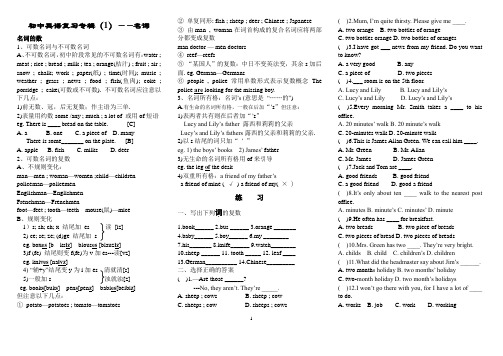
初中英语复习专辑(1)——名词名词的数1、可数名词与不可数名词A、不可数名词,初中阶段常见的不可数名词有:water ; meat ; rice ; bread ; milk ; tea ; orange(桔汁) ; fruit ; air ; snow ; chalk; work ; paper(纸) ; time(时间); music ; weather ; grass ; news ; food ; fish(鱼肉); coke ; porridge ; cake(可数或不可数). 不可数名词应注意以下几点:1)前无数、冠,后无复数;作主语为三单.2)表量用约数some /any ; much ; a lot of 或用of短语eg. There is ____ bread on the table. [C]A. aB. oneC. a piece ofD. manyThere is some_______ on the plate. [B]A. appleB. fishC. milksD. deer2、可数名词的复数A、不规则变化:man—men ; woman—women ;child—children policeman—policemenEnglishman—Englishmen Frenchman—Frenchmenfoot—feet ; tooth—teeth mouse(鼠)—miceB、规则变化1)s; sh; ch; x 结尾加es 读[iz]2) ce; se; ze; (d)ge 结尾加seg. box es [b ks iz] blous es [blauz iz]3)f (fe) 结尾则变f(fe)为v加es---读[vz]eg. kniv es [na ivz]4) ―辅+y‖结尾变y为i加es 清就清[s]5)一般加s 浊就浊[z]eg. book s[buk s] pen s[pen z] babi es[beibi z]但注意以下几点:①potato—potatoes ; tomato—tomatoes ②单复同形: fish ; sheep ; deer ; Chinese ; Japanese③由man , woman在词首构成的复合名词应将两部分都变成复数man doctor — men doctors④reef—reefs⑤“某国人”的复数:中日不变英法变,其余s加后面. eg. German—Germans⑥people , police 常用单数形式表示复数概念Thepolice are looking for the missing boy.3、名词所有格:名词’s (意思是―……的‖)A.有生命的名词所有格,一般在后加“’s”但注意:1)表两者共有则在后者加“’s”Lucy and Lily’s father 露西和莉莉的父亲Lucy’s and Lily’s fathers露西的父亲和莉莉的父亲.2)以s结尾的词只加“’ ”eg. 1) the boys’ books 2) James’ father3)无生命的名词所有格用of来引导eg. the leg of the desk4)双重所有格:a friend of my father’sa friend of mine ( √) a friend of my( × )练习一、写出下列词.的复数1.book______2.bus ______3.orange _______4.baby______5.boy______6.my ________7.his_______ 8.knife______ 9.watch________10.sheep ______ 11. tooth _____ 12. leaf ____13.German__________ 14.Chinese_________二、选择正确的答案( )1.—Are those ______?---No, they aren’t. They’re _____.A. sheep ; cowsB. sheep ; cowC. sheeps ; cowD. sheeps ; cows( )2.Mum, I’m quite thirsty. Please give me ____.A. two orangeB. two bottles of orangeC. two bottles orangeD. two bottles of oranges( )3.I have got ___ news from my friend. Do you wantto know?A. a very goodB. anyC. a piece ofD. two pieces( )4.___ room is on the 5th floor.A. Lucy and LilyB. Lucy and Lily’sC. Lucy’s and LilyD. Lucy’s and Lily’s( )5.Every morning Mr. Smith takes a ____ to hisoffice.A. 20 minutes’ walkB. 20 minute’s walkC. 20-minutes walkD. 20-minute walk( )6.This is James Allan Green. We can call him ____.A. Mr. GreenB. Mr. AllanC. Mr. JamesD. James Green( )7.Jack and Tom are ____.A. good friendsB. good friendC. a good friendD. good a friend( )8.It’s only about ten ____ walk to the nearest postoffice.A. minutesB. minute’sC. minutes’D. minute( )9.He often has ____ for breakfast.A. two breadsB. two piece of breadsC. two pieces of breadD. two pieces of breads( )10.Mrs. Green has two ____. They’re very bright.A. childsB. childC. children’sD. children( )11.What did the headmaster say about Jim’s ______.A. two month s holidayB. two months’ holidayC. two-month holidayD. two month’s holidays( )12.I won’t go there with you, for I have a lot of ____to do.A. worksB. jobC. workD. working1( )13.Li Lei is a friend of ___.A. I sisterB. my sister’sC. me sisterD. my sister of( )14.Have you read ____?A. today’sB. today paperC. the today’s paperD. today’s paper( )15.How many ___ are there in the room?A. boxesB. boxC. boxsD. boxxes( )16.Many ____ have been built in our city since 1987.A. factorysB. factoriesC. factoryesD. factorys( )17.There are lots of ___ in the basket on the table .A. tomatosB. tomatoC. tomatoesD. tomatoss( )18.The cat caught two ___ last night.A. mousesB. miceC. mouseD. mices( )19.Jack went to have two ___ pulled out yesterday afternoon.A. toothsB. toothC. teethD. toothes( )20.In our school there are fifty-five ___.A. women teachersB. woman teachersC. women teacherD. woman’s t eacher( )21.The three ___ will be put into prison.A. thiefsB. thiefC. thievesD. thiefs’练习答案:一、1. books2. buses3. oranges4. babies5. boys6. our7. their 8. knives 9. watches10. sheep 11. teeth 12. leaves13. Germans 14. Chinese二、1——5 ABCBD 6—10 AACCD11—15 CCBDA 16—21 BCBCAC初中英语复习专辑(2)——冠词1、不定冠词a, ana用在辅音音素开头的词前eg. a booka u seful book a ―u‖[j u:sful] [j u:]an用于元音开头的词前. eg. an applean hour an ―F‖[au] [ef]2、定冠词the1)特指某人/某物The book on the desk is mine.2)世上独一无二的事物前the sun , the moon, the earth, the sky3)形、副最高级及序数词前The third boy is the tallest of all.(但当这些词前已有其他限定词,如物主代词、所有格、指示代词时,则不能再用the)He is my first English teacher.4)the + 姓的复数表示“某家人”或“某夫妇”。
中考英语必考单词 知识点讲解(121-170词讲义)

伤了某人的背部 have a backache 背痛
148、baby 形容词,幼小的 名词,婴儿 -babies(复数)
135、build 动词,建造 -built-built(过去式和过去分词) -building(名词,建筑物;房子) build up 逐步建立;增强
136、burn 动词,着火;燃烧 -burned-burned(过去式和过去分词) -burnt-burnt(过去式和过去分词) -burning(形容词,着火的;燃烧的) burn out 烧尽;熄灭
burn up 被烧毁;被烧掉
137、buy 动词,购买;买 -bought-bought(过去式和过去分词) -have(延续性动词)
buy sb sth =buy sth for sb 给某人买某物
138、bad 形容词,坏的;糟的 -worse(比较级) -worst(最高级) -badly(副词,严重地)
beat sb 击败某人 beat sb in/at sth 在某方面击败某人
129、become 动词,变成
-became(过去式) -become(过去分词) become more and more beautiful 变得越来越漂亮 become successful 变得成功 become 的延续性动词是 be He has been a teacher for ten years. 他已经当了 10 年老师了。
144、boring 形容词,没趣的;令人厌倦的 sound boring 听起来是无聊的
145、brave 形容词,勇敢的;无畏的 -bravely 副词,勇敢地;无畏地
146、British 形容词,英国的;英国人的
147、back 副词,回来 名词,背部
- 1、下载文档前请自行甄别文档内容的完整性,平台不提供额外的编辑、内容补充、找答案等附加服务。
- 2、"仅部分预览"的文档,不可在线预览部分如存在完整性等问题,可反馈申请退款(可完整预览的文档不适用该条件!)。
- 3、如文档侵犯您的权益,请联系客服反馈,我们会尽快为您处理(人工客服工作时间:9:00-18:30)。
初三英语系列复习资料一.短语动词和句型【考点直击】1. 短语动词的辨析;2. 英语句子的基本句型结构;3. 初中阶段主要句型的用法。
【名师点睛】短语动词是中考的重要内容之一。
在初中阶段,我们已经学习了不少短语动词,把他们加以归纳总结,进行重点复习是十分必要的。
英语中有许多短语动词在意义上是一个整体,其用法有的相当于及物动词,有的相当于不及物动词,有的兼有及物动词和不及物动词的特征。
1. 短语动词的分类(1)动词+介词常见的有look for, look after, ask for, laugh at, hear of 等。
这类短语动词的宾语只能放在介词后。
如:Don’t laugh at others.Tom asked his parents for a bike.(2)动词+副词常见的有give up, pick up, think over, find out, hand in,等。
这类短语动词的宾语如果是名词,既可放在副词前边,又可放在副词后边;宾语如果是人称代词或反身代词,则要放在副词前边。
如:You’ll hand in your homework to morrow. Please don’t forget to hand it in.(3)动词+副词+介词常见的有go on with, catch up with等。
这类短语动词的宾语只能放在介词后边。
如:Go on and I’ll catch up with you in five minutes.After a short rest, he went on with his research work.(4)动词+名词+介词常见的有take care of, make use of, pay attention to, make fun of 等。
这类短语动词的宾语只能放在介词后边。
如:You should pay attention to your handwriting.We should make full use of our time.(5)动词+形容词常见的有leave open, set free, cut open等。
这类短语动词的宾语如果是名词,则宾语可放在形容词的前边,也可放在后边;宾语如果是人称代词或反身代词,则必须放在形容词前边。
如:The prisoners were set free.He cut it open.(6)动词+名词常见的有take place, make friends等。
这类短语动词用作不及物动词。
如:This story took place three years ago.I make friends with a lot of people.2. 短语动词的辨析(1)be made in(在……生产或制造),be made of(由……组成或构成)(2)come down(下来;落),come along(来;随同),come to oneself(苏醒),come true(实现),come out(花开;发芽;出现;出来),come over(过来;顺便来访),come in(进来),come on(来吧;跟着来;赶快), come up with(找到;提出)(3)do one’s best(尽最大努力), do well in(在……干得好), do one’s homework(做作业),do some reading(阅读)(4)fall asleep(入睡),fall behind(落在…..后面),fall off(从……掉下),fall down(到下;跌倒)(5)get down(下来;落下),get on(上车),get to(到达),get up(起床),get back(回来;取回),get off(下来),get on well with(与……相处融洽),get married(结婚),get together(相聚) (6)give up(放弃),give…a hand(给与……帮助),give a concert(开音乐会)(7)go back(回去),go on(继续),go home(回家),go to bed(睡觉),go over(过一遍;仔细检查),go out(外出;到外面),go wrong(走错路),go on doing(继续做某事),go shopping(买东西),go boating(去划船), go fishing(去钓鱼),go hiking(去徒步旅行),go skating(去滑冰),go straight along(沿着……一直往前走)(8)have a look(看一看), have a seat(坐下), have supper(吃晚餐), have a rest(休息), have sports(进行体育活动), have a cold (感冒), have a cough(咳嗽), have a good time(过得愉快), have a headache(头痛),have a try(尝试;努力)(9)look for(寻找),look out(留神; 注意),look over(仔细检查),look up(向上看;抬头看),look after(照顾; 照看),look at(看;观看),look like(看起来像),look the same(看起来像),(10)make friends(交朋友),make phone calls(打电话),make money(赚钱),make the bed(整理床铺),make a noise(吵闹),make a faces(做鬼脸),make one’s way to(往……走去),make room for(给……腾出地方),make a decision(做出决定),make a mistake(犯错误),make up one’s mind(下决心)(11)put on(上演;穿上;戴上),put up(挂起;举起),put down(把某物放下来),put away(把某物收起来), put off(推迟) (12)take off(脱掉衣服),take photos(照相),take time(花费时间),take out(取出),take a seat(坐下),take an active part in(积极参加),take care of(照顾;照料;注意),take exercise(做运动),take one’s place(坐某人的位置;代替某人的职务),take turn(轮流) (13)talk about(谈话;交谈),talk with(和……交谈)(14)turn on(打开电灯,收音机,煤气,自来水等),turn off(关上电灯,收音机,煤气,自来水等),turn down(关小;调低),turn…over(把..翻过来) (15)think of(认为,想起)think about(考虑) 3.句子的基本句型结构根据句子所用动词的不同,句子可归纳为五个基本句型。
(1)主语+连系动词+表语。
例如:My mother is a doctor.Her voice sounds nice.(2)主语+不及物动词。
例如:He runs fast.We study hard.(3)主语+及物动词+宾语。
例如:Children often sing this song.He studies English.1)常用-ing形式, 而不用不定式作宾语的动词有:enjoy, finish, feel like, consider, practise, keep, suggest, mind等。
例如:She enjoys reading novels and swimming.I finished reading the book last night.2)常用不定式,而不用-ing形式作宾语的动词有:wish, hope, agree, plan, decide, refuse等。
例如:Where do wish to sit?Tom agreed to lend some money.3)有些及物动词既可用不定式,由可用-ing形式作宾语,但意义不同。
这类动词常见的有:remember, forget等。
例如:Please remember to post the letter for me. 请记住替我发了这封信。
I remember posting the letter.我记得那封信寄过了。
Stop的用法同上面的词相仿,不过stop 后面跟不定式不是作宾语,而是作状语。
试比较下列句子:He stopped to smoke. 他停下来吸烟。
He stopped smoking. 他停止吸烟了。
4)有些及物动词的宾语,既可用不定式,又可用-ing形式,意义基本相同。
这类动词常见的有:like, love, hate, begin, start, continue等。
例如:I like to swim in summer.I like swimming in summer.(4)主语+及物动词+ 间接宾语+直接宾语。
例如:My father bought me a new bike.He gave me an apple.1)及物动词之后跟有双宾语,往往一个指人,一个指物。
指人的为间接宾语,指物的为直接宾语。
一般情况下,间接宾语在前,直接宾语在后。
如果要把间接宾语放在直接宾语之后,间接宾语前需加介词。
例如:Please pass me a cup of tea.= Please pass a cup of tea to me.Show me your new book, please. =Please show your new book to me.2)把间接宾语放在直接宾语之后,间接宾前有时加介词to, 有时加介词for,这主要取决于谓语动词。
一般在动词give, tell, sell, lend, show之后加to。
在动词buy, make, get等之后加for。
例如:Would you lend me your dictionary, please? =Would you lend your dictionary to me, please?Tom’s mother bought him a pair of new shoes. =Tom’s mother bought a pair of new shoes for him.(5)主语+及物动词+宾语+宾语补足语。
